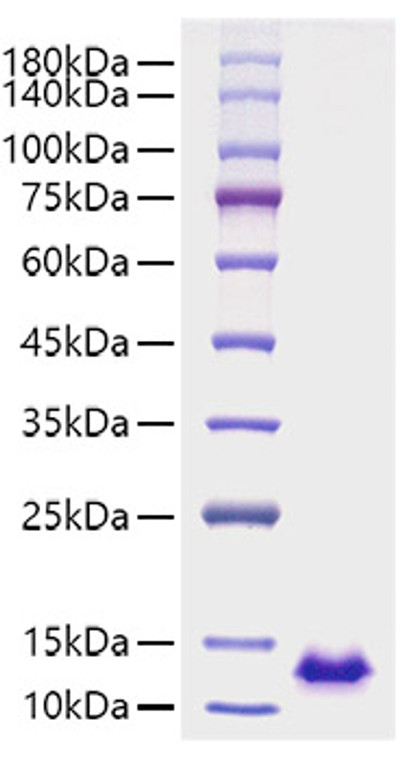| Host: |
Pichia |
| Reactivity: |
Human |
| Note: |
STRICTLY FOR FURTHER SCIENTIFIC RESEARCH USE ONLY (RUO). MUST NOT TO BE USED IN DIAGNOSTIC OR THERAPEUTIC APPLICATIONS. |
| Short Description: |
Recombinant-Human CXCL12/SDF-1-NO-tag protein was developed from pichia and has a target region of NO-tag. For use in research applications. |
| Formulation: |
Lyophilized from a 0.22 Mu m filtered solution of PBS, pH 7.4. |
| Storage Instruction: |
Store at-20°C for up to 1 year from the date of receipt, and avoid repeat freeze-thaw cycles. |
| Gene Symbol: |
CXCL12 |
| Gene ID: |
6387 |
| Uniprot ID: |
SDF1_HUMAN |
| Immunogen Region: |
Lys22-Lys89 |
| Immunogen: |
Recombinant Human CXCL12/SDF-1 Protein is produced by Pichia expression system. The target protein is expressed with sequence (Lys22-Lys89) of human CXCL12/SDF-1 (Accession #NP_954637.1.) fused with no additional amino acid. |
| Post Translational Modifications | Processed forms SDF-1-beta(3-72) and SDF-1-alpha(3-67) are produced after secretion by proteolytic cleavage of isoforms Beta and Alpha, respectively. The N-terminal processing is probably achieved by DPP4. Isoform Alpha is first cleaved at the C-terminus to yield a SDF-1-alpha(1-67) intermediate before being processed at the N-terminus. The C-terminal processing of isoform Alpha is reduced by binding to heparin and, probably, cell surface proteoglycans. |
| Function | Chemoattractant active on T-lymphocytes and monocytes but not neutrophils. Activates the C-X-C chemokine receptor CXCR4 to induce a rapid and transient rise in the level of intracellular calcium ions and chemotaxis. SDF-1-beta(3-72) and SDF-1-alpha(3-67) show a reduced chemotactic activity. Binding to cell surface proteoglycans seems to inhibit formation of SDF-1-alpha(3-67) and thus to preserve activity on local sites. Also binds to atypical chemokine receptor ACKR3, which activates the beta-arrestin pathway and acts as a scavenger receptor for SDF-1. Binds to the allosteric site (site 2) of integrins and activates integrins ITGAV:ITGB3, ITGA4:ITGB1 and ITGA5:ITGB1 in a CXCR4-independent manner. Acts as a positive regulator of monocyte migration and a negative regulator of monocyte adhesion via the LYN kinase. Stimulates migration of monocytes and T-lymphocytes through its receptors, CXCR4 and ACKR3, and decreases monocyte adherence to surfaces coated with ICAM-1, a ligand for beta-2 integrins. SDF1A/CXCR4 signaling axis inhibits beta-2 integrin LFA-1 mediated adhesion of monocytes to ICAM-1 through LYN kinase. Inhibits CXCR4-mediated infection by T-cell line-adapted HIV-1. Plays a protective role after myocardial infarction. Induces down-regulation and internalization of ACKR3 expressed in various cells. Has several critical functions during embryonic development.required for B-cell lymphopoiesis, myelopoiesis in bone marrow and heart ventricular septum formation. Stimulates the proliferation of bone marrow-derived B-cell progenitors in the presence of IL7 as well as growth of stromal cell-dependent pre-B-cells. |
| Protein Name | Stromal Cell-Derived Factor 1Sdf-1Hsdf-1C-X-C Motif Chemokine 12Intercrine Reduced In HepatomasIrhHirhPre-B Cell Growth-Stimulating FactorPbsf Cleaved Into - Sdf-1-Beta(3-72 - Sdf-1-Alpha(3-67 |
| Database Links | Reactome: R-HSA-1251985Reactome: R-HSA-376176Reactome: R-HSA-380108Reactome: R-HSA-418594Reactome: R-HSA-9018519 |
| Cellular Localisation | Secreted |
| Alternative Protein Names | Stromal Cell-Derived Factor 1 proteinSdf-1 proteinHsdf-1 proteinC-X-C Motif Chemokine 12 proteinIntercrine Reduced In Hepatomas proteinIrh proteinHirh proteinPre-B Cell Growth-Stimulating Factor proteinPbsf Cleaved Into - Sdf-1-Beta(3-72 - Sdf-1-Alpha(3-67 proteinCXCL12 proteinSDF1 proteinSDF1A proteinSDF1B protein |
Information sourced from Uniprot.org
12 months for antibodies. 6 months for ELISA Kits. Please see website T&Cs for further guidance





